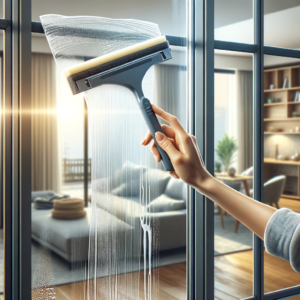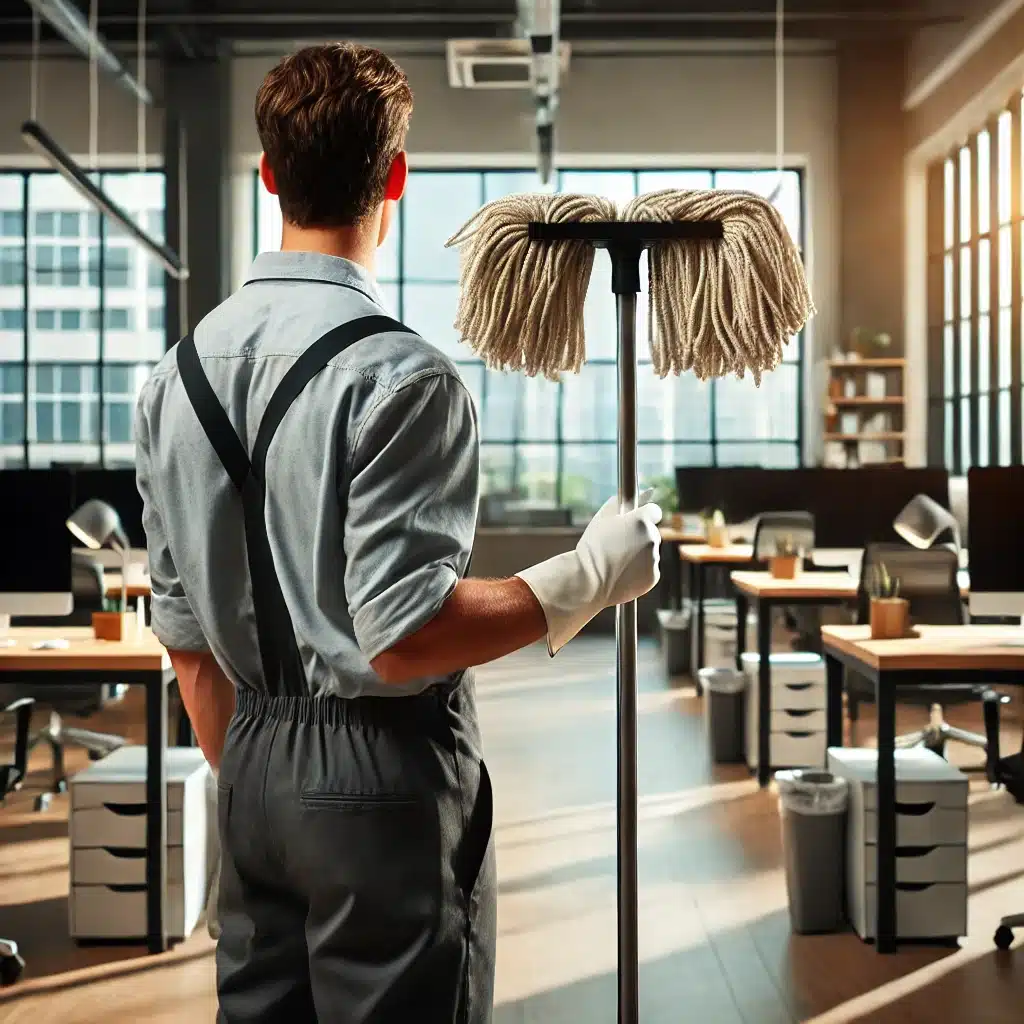Keeping a workplace clean and healthy isn’t just about aesthetics; it’s about ensuring the well-being of everyone who steps into the building. Janitors play a crucial role in this mission. Here are five key insights into why janitors are indispensable in maintaining a healthy workplace.
1. First Line of Defense Against Germs
Janitors are the frontline workers when it comes to battling germs and bacteria, playing an essential role in maintaining the health and safety of the workplace. Their daily tasks involve meticulous cleaning and disinfection of high-touch areas such as doorknobs, light switches, and communal spaces like break rooms and restrooms. By focusing on these critical points, janitors help reduce the spread of harmful pathogens that can cause illnesses. This proactive approach to cleanliness is vital in preventing outbreaks of common workplace infections, such as colds, flu, and other contagious diseases.
Moreover, janitors use specialized cleaning agents and disinfectants that are designed to kill bacteria and viruses on contact. Their expertise in selecting and using the right products ensures that every surface is not just visibly clean but also sanitized. This level of cleanliness creates a safer environment for employees, reducing the risk of disease transmission. When janitors effectively manage and eliminate potential sources of infection, they help to decrease the overall number of sick days taken by employees, thereby enhancing productivity and maintaining the smooth operation of the workplace.
In addition to the immediate health benefits, the work of janitors fosters a culture of cleanliness and hygiene among employees. When staff members observe the diligent efforts of janitors in keeping the workplace sanitary, they are more likely to adopt similar habits, such as regular handwashing and maintaining personal workspaces.
2. Improved Air Quality
In any office environment, dust, allergens, and pollutants can accumulate at an alarming rate, significantly affecting indoor air quality. This is where the expertise of a janitor becomes indispensable. Janitors are responsible for the regular cleaning and maintenance of air filters, ensuring that these essential components of the HVAC system function optimally. By routinely replacing or cleaning air filters, janitors help to trap airborne particles that can otherwise circulate through the office, reducing the concentration of dust and allergens in the air.
In addition to managing air filters, janitors play a crucial role in keeping surfaces dust-free. Dust can settle on desks, shelves, and other surfaces, becoming a source of indoor air pollution every time it is disturbed. Janitors meticulously dust these areas, preventing the build-up of particles that can exacerbate allergies and respiratory issues among employees. Their thorough cleaning routines extend to less obvious areas, such as vents and behind large office equipment, where dust can accumulate unnoticed but significantly impact air quality.
Furthermore, janitors maintain and monitor ventilation systems to ensure they operate efficiently. Proper ventilation is vital in expelling stale air and introducing fresh air into the office, which helps dilute indoor pollutants and control humidity levels. By keeping these systems in good working order, janitors contribute to a healthier indoor environment. Improved air quality directly correlates with enhanced employee productivity and well-being, as clean air reduces the likelihood of respiratory problems and other health issues that can lead to absenteeism and decreased performance.

3. Enhanced Workplace Morale
A clean and tidy workplace is more than just a matter of aesthetics; it has a profound impact on employee morale. The efforts of a janitor in maintaining a spotless environment contribute significantly to creating a pleasant and professional atmosphere. When employees walk into a clean, well-organized office, it sets a positive tone for their day, making them feel more comfortable and motivated. The presence of a dedicated janitor who ensures the workplace remains clean demonstrates that the company values its employees’ well-being and takes pride in providing a healthy and welcoming environment.
Moreover, the meticulous work of janitors can foster a sense of respect and appreciation among employees. When people see that their work environment is cared for, they are more likely to respect it and contribute to its upkeep. This mutual respect can lead to a stronger sense of community and teamwork within the office. Employees who work in a clean environment are also more likely to take pride in their personal workspaces, keeping them organized and clutter-free. This collective effort to maintain cleanliness can improve overall workplace morale, leading to a more harmonious and productive work environment.
Additionally, the presence of a clean and orderly workplace can directly influence job satisfaction and employee retention. When janitors maintain high standards of cleanliness, it can reduce stress and distractions, allowing employees to focus better on their tasks. A well-maintained workspace can also enhance the company’s image, making employees feel proud to be part of an organization that values professionalism and attention to detail. The consistent efforts of janitors in creating a pristine environment play a crucial role in fostering a positive workplace culture, where employees feel valued, motivated, and satisfied with their jobs.
4. Safety and Hazard Prevention
Janitors play a crucial role in maintaining safety standards within the workplace, acting as the unsung heroes who ensure that potential hazards are addressed promptly. One of the primary responsibilities of a janitor is to keep floors dry and free of obstacles, thereby significantly reducing the risk of slips and falls. This task might seem straightforward, but it requires constant vigilance and a proactive approach. Whether it’s mopping up spills immediately or strategically placing wet floor signs, janitors are instrumental in preventing accidents that could result in injuries.
Beyond managing immediate hazards like wet floors, janitors conduct regular maintenance checks to identify and address potential safety issues before they escalate. These checks include inspecting lighting to ensure all areas are well-lit, examining electrical cords for wear and tear, and ensuring that exit routes are clear and accessible. By systematically checking these and other elements, janitors help create a safer environment where employees can work without the fear of unforeseen accidents. Their keen eye for detail means that small problems are often caught and rectified before they can become serious safety concerns.
Moreover, the role of a janitor in safety extends to maintaining equipment and facilities. For instance, janitors ensure that fire extinguishers are in place and functioning, emergency exits are unobstructed, and first aid supplies are stocked and accessible. They also play a part in training and informing employees about safety protocols, such as the proper disposal of hazardous materials and the importance of maintaining a clutter-free workspace. Through these efforts, janitors contribute to a culture of safety that permeates the workplace, ensuring that all employees are aware of and adhere to safety standards.

5. Support for Sustainability
Many janitors are now trained in eco-friendly methods, using products that minimize environmental impact. These green cleaning practices involve the use of biodegradable, non-toxic cleaning agents that are safe for both the environment and the health of employees. By adopting these sustainable practices, janitors help reduce the workplace’s carbon footprint and contribute to broader environmental conservation efforts.
The commitment of janitors to sustainability also includes reducing waste and improving resource efficiency. For instance, janitors often implement recycling programs, ensuring that waste is properly sorted and recyclable materials are diverted from landfills. They may also use microfiber cleaning cloths and mops, which require less water and fewer chemicals than traditional cleaning materials. Additionally, janitors might advocate for the use of energy-efficient equipment and lighting within the workplace, further supporting the company’s sustainability initiatives. Through these actions, janitors play a vital role in helping companies meet their environmental goals and adhere to regulatory standards.
Furthermore, the emphasis on sustainability by janitors contributes to creating a healthier workplace environment for everyone. Eco-friendly cleaning products reduce the presence of harmful chemicals in the air, which can lead to better indoor air quality and fewer health issues for employees, such as allergies and respiratory problems. This not only enhances the well-being of the workforce but also boosts overall productivity, as employees are less likely to suffer from health-related absences. By integrating sustainability into their daily routines, janitors help cultivate a work culture that values and respects environmental responsibility, encouraging employees to adopt greener habits both in and out of the workplace.
The Importance of Janitors
Janitors are essential in keeping workplaces not only clean but also healthy and safe. Their efforts in maintaining hygiene, improving air quality, boosting morale, ensuring safety, and supporting sustainability are invaluable. Janitors work diligently behind the scenes, ensuring that every corner of the workplace is spotless and free from potential health hazards. This dedication to cleanliness helps reduce the spread of germs and allergens, creating a healthier environment where employees can thrive without the constant threat of illness. Their meticulous work directly translates into fewer sick days and higher productivity, underscoring their critical role in workplace health management.
Moreover, janitors significantly contribute to improving air quality within office spaces. They maintain air filters, dust surfaces, and ensure proper ventilation, which collectively enhance the air we breathe. This improvement in air quality is crucial for reducing respiratory issues and boosting overall employee well-being. In addition to health benefits, janitors also play a vital role in fostering a positive and professional atmosphere. A clean, well-maintained workspace reflects the organization’s commitment to excellence and care for its employees, which can greatly enhance morale and job satisfaction. The presence of a janitor who ensures cleanliness and orderliness conveys a message that the company values its employees’ health and comfort.
Furthermore, janitors are integral to workplace safety and sustainability. They regularly inspect and maintain the facility to prevent accidents and hazards, ensuring a safe environment for everyone. Their use of eco-friendly cleaning products and sustainable practices not only helps reduce the environmental footprint of the office but also promotes a culture of sustainability among employees. By adopting green cleaning methods, janitors help organizations achieve their environmental goals while also ensuring a healthier, toxin-free workplace. Their comprehensive role in maintaining cleanliness, safety, and sustainability makes janitors indispensable to the smooth operation and overall success of any organization.





